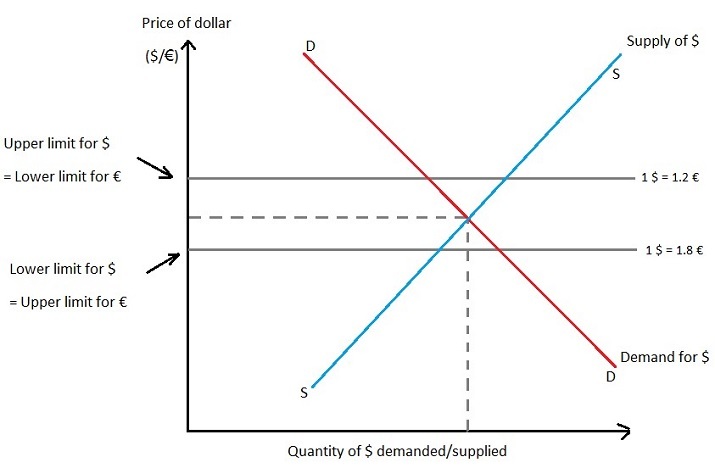
 Data Structure
Data Structure Networking
Networking RDBMS
RDBMS Operating System
Operating System Java
Java MS Excel
MS Excel iOS
iOS HTML
HTML CSS
CSS Android
Android Python
Python C Programming
C Programming C++
C++ C#
C# MongoDB
MongoDB MySQL
MySQL Javascript
Javascript PHP
PHP
- Selected Reading
- UPSC IAS Exams Notes
- Developer's Best Practices
- Questions and Answers
- Effective Resume Writing
- HR Interview Questions
- Computer Glossary
- Who is Who
Merits and Demerits of Flexible and Fixed Exchange Rate Systems
Introduction
Exchange rate refers to the value of a currency when it is compared to another currency. That means the exchange rate shows how much local currency would be required to buy a certain amount of another currency. Usually, the comparison of local currency is done with US dollars. There are two types of exchange rate systems Fixed and Flexible.
In the case of a fixed exchange rate system, the government or the central bank interferes to keep the value of currency fixed. On the other hand, in the case of a flexible exchange rate system, the supply and demand of the currencies define the value of the currency. Both flexible and fixed exchange rates have their own merits and demerits.

Merits of Flexible Exchange Rate System
Undervaluation and overvaluation of currency are adjusted automatically
In the case of a flexible exchange rate, the government or the central bank does not have to keep the value of the currency fixed. Therefore, the value is adjusted by the demand and supply of the currency in the international markets.
When there is a deficit in the Balance of Payments (BoP) resulting in an overvaluation of the currency, its value will automatically go down. This will make exports cheaper and imports costlier. Thus, the increase in exports and decrease in imports will automatically adjust the BoP, making the value of the currency stay at a stable rate automatically. The opposite of this will occur in the case of undervaluation.
Enhancement of multilateral trade
The flexible exchange rate system is a boon for the growth of the multilateral trade system. As imports and exports in the case of a flexible exchange rate are unaffected by government intervention, it allows international players to enter freely operating markets more easily. This the countries having a flexible exchange rate mechanism see enhancements in multilateral trade.
No large fluctuations in the value of the currency
In the case of a flexible exchange rate system, the value of the currency need not fluctuate too much. As the value of currency often fluctuates due to economic conditions, overvaluations and under valuations are avoided in the system and occur only when there are large variations in the supply of and demand for the currency.
Works well for individual freedom
Another merit of a flexible exchange rate system is that it allowed individuals to pursue their activities in the international markets more freely than fixed exchange rate systems. The controllers of the exchange rate being in the hands of the public allow for more freedom for individuals as the government does not interfere in economic activities usually.
Freedom from BoP for the governments
Flexible exchange rate systems free the government from the BoP issues. As the exchange rate becomes dependent on the demand and supply of currencies, the government needs not consider its policies for maintaining the BoP. Therefore, governments can focus on more important duties, such as inflation, unemployment, and other aspects of the economy.
Demerits of Flexible Exchange Rate System
Economic uncertainty and instability
According to some economists, too frequent changes in the exchange rate systems lead to uncertainty and instability in the values of currency. This may have a negative effect on capital movements and foreign trade between two nations.
Negative impact on foreign trade
In the case of a flexible exchange rate system, traders are often unsure about the exact value of their local currencies in the international markets which keep fluctuating over time. This may impact international trade negatively.
The inflationary bias
A flexible exchange rate system may be responsible for inflation when the BoP of a country is affected and there is a deficit in it. Due to the lack of availability of another currency, the government may need to borrow a certain currency to manage the BoP which may lead to inflation.
Merits of Fixed Exchange Rate system
Exchange rate stability
The greatest merit of a fixed exchange rate system is that the currency under such a regime has stability in its value. The stability of currency rates makes it helpful for both importers and exporters to price their items without any confusion which may be beneficial for the growth of an economy.
Promotion of Capital Movements
The fixed exchange rate system facilitates the movement of capital goods. As there is no uncertainty about the exchange rate, the loss arising from a devaluing currency is avoided in the case of a fixed exchange rate system. This helps in the growth of foreign capital investments.
Prevention of large capital outflow
Floating or flexible exchange rate systems may lead to large capital outflows that may hamper economies. A capital outflow that is too large may create BoP instability which is unhealthy for a nation's economy. As fixed exchange rate systems do not involve any fluctuation, the capital outflow remains fixed and pre-set. That helps the economies mitigate such situations.
Stops foreign exchange market speculations
When the value of the currencies is fixed no speculation about their value takes place in the international markets. The traders in Forex markets try to take advantage of fluctuations in the market in the case of flexible foreign exchange rates which is not possible in the case of fixed exchange rates.
Anti-inflationary measures
Governments in fixed exchange rate countries need to take immediate steps to curb inflation because fixed currency value may depreciate during inflation. Therefore, inflation occurs less frequently in such countries. On the other hand, if the exchange rate system is flexible, there are more chances of inflation in the economy because the value of the currency is not regulated by the central bank or the government.
Demerits of Fixed Exchange Rate System
Loss of foreign assets and gold
Countries that have fixed exchange rate systems lose assets and gold more than countries that have flexible rates. This is so because the countries with flexible systems get their BoPs adjusted by market forces while in the case of fixed systems, the exchange rates must be kept stable using foreign currencies or gold.
Inflationary Temperament
Countries with fixed exchange rate systems may require to adjust their BoP surplus when their reserve of foreign currencies goes up more than required. This expands the money supply which may create inflation if not adjusted by other economic policies.
Capital Outflows
The government of a country that has a fixed exchange rate system must allow capital outflows when the BoP of the country is in excess surplus. This may dampen the exports, and lead to an economic downturn due to large capital outflows which are usually averted in the case of a flexible exchange rate system.
Conclusion
Having an idea of the merits and demerits of flexible and fixed exchange rate systems helps economists find a balance for the economy to stay stable and certain. They are therefore indispensable in the sense of economic growth.
FAQs
Q1. What is meant by the exchange rate?
Ans. The exchange rate refers to the value of a currency when it is compared to another currency.
Q2.What is the advantage of flexible exchange rate systems regarding the valuation of the currency?
Ans. It is the undervaluation and overvaluation of currency that are adjusted automatically in the case of a flexible exchange rate system.
Q3.Does a fixed rate regime promote capital movements?
Ans. Yes. The fixed exchange rate regime supports and promotes capital movements.

